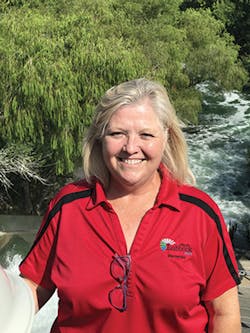Trenia Harris’ life has been marked with work experiences into which she taps as she executes her current responsibilities as the stormwater program manager for Lubbock, TX.
Working for 13 years as vice-president for her late father Bob’s construction business, Craze Construction, she not only did administrative work such as keeping the books and bidding jobs, but also ran pneumatic rollers, poured concrete, laid hot mix, and shoveled to help get the work done. Today, Harris, a Certified Professional in Municipal Stormwater Management, has a keen understanding of the regulatory concerns attached to stormwater management as well as the challenges faced by builders and developers regarding drainage considerations they must make. Although Lubbock is flat and receives an average of only 18 inches of rain annually, many features of the area keep Harris busy in her role. When it rains, it tends to pour torrentially within a brief time. “We have a lot of sheet flow,” she notes. “It doesn’t have anywhere to go that quickly.” The city has three underground drainage systems as well as 144 playa lakes—shallow wetlands that form after a rain event and then drain. Some are connected to the underground storm sewer systems, but most of them are naturally occurring retention basins. Lubbock has a four-tiered stormwater utility fee based on impervious area that includes a commercial/non-residential utility fee. Future plans call for a drainage improvement project in the city’s medical district focused on alleviating the area’s serious flooding.
What She Does Day to Day
Harris directs a staff of six: one plan analyst, four construction inspectors, and an industrial inspector. She manages the city’s MS4 permit, which consists of writing and updating the stormwater management plan and reporting requirements to the Texas Commission on Environmental Quality (TCEQ). Harris works with many city departments and the public to educate and enforce federal, state, and local stormwater ordinance regulations. She is an active member of the Public Works Association, Water Environment Federation, West Texas Home Builders Association, and International Erosion Control Association and has served on the board of directors of the South Central IECA chapter.
What Led Her to This Line of Work
As she worked with her father in his business, he encouraged her to pursue a career in the environmental field as he contemplated careers with future demand. Harris attended Texas Tech University and earned a B.S. degree in organizational management from Lubbock Christian University, attending school while working in Lubbock’s building inspection department for five years. “When the stormwater program manager position became available in 2007, I was very excited for the chance to make my father proud,” she notes, adding that the department was expanding in response to the work needed to stay current with MS4 regulations and comply with the Construction General Permit and Multi-Sector General Permit.
What She Likes Best About Her Work
Harris notes that the best part of her work is being part of a team whose members work hard, look for creative ways to get the job done, and work in concert to accomplish the necessary tasks. Additionally, “I want to make a difference in local government, the environment, and the stormwater industry,” she says.

